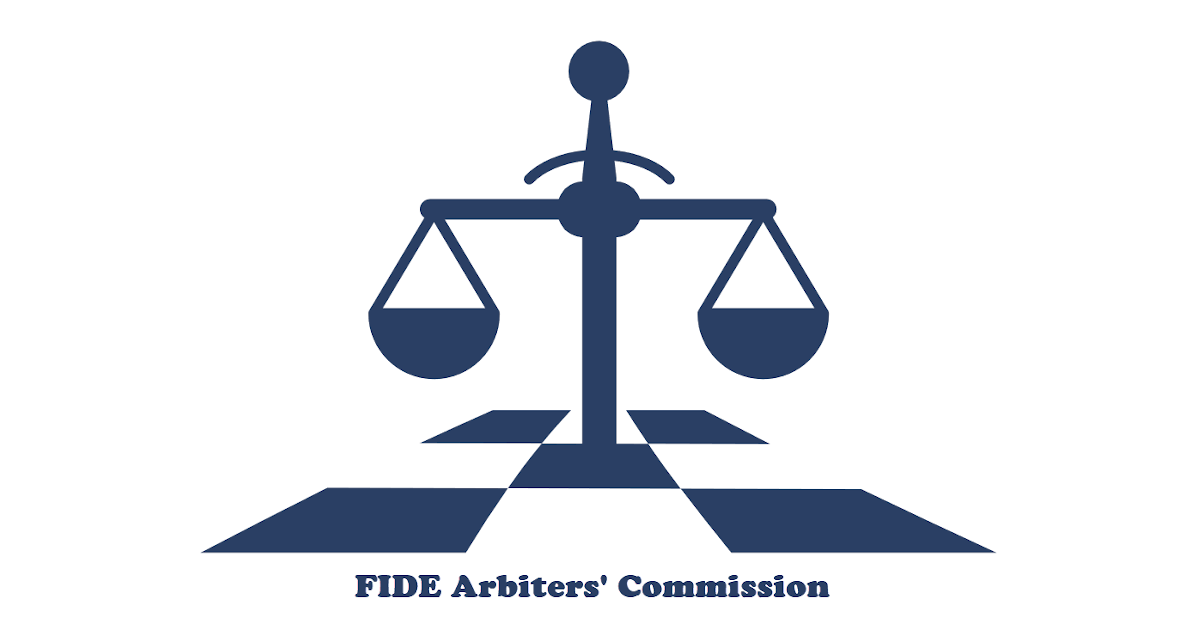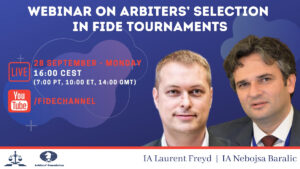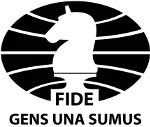


FIDE Arbiters’ Commission will host an online workshop for federations on arbiters’ title applications on June 18 [Thursday], 15:00 – 17:00 CEST.

This 3rd webinar by the FIDE Arbiters’ Commission will focus on the selection of arbiters in FIDE Tournaments.
Following a request by the FIDE Council to explain the criteria for the selection of arbiters, Laurent Freyd, FIDE Arbiters’ Commission Chairman, and Nebojsa Baralic, FIDE Arbiters’ Commission Secretary, will try to give you a global overview on the topic “selections”:
- An analysis of the current regulations and practices
- A case study about the recent call of interest for the Chess Olympiad
- This will also be an opportunity to share a status on the transition to a more structured way of handling selections
Join us Live through the link below!
This course is a 4 times 2 hours curriculum focused on the Basic level of online and hybrid arbiters:
Lecture 1: Introduction to Online Arbiters: roles, processes and tools
Lecture 2: FIDE Online Tournament Regulations and Supervision
Lecture 3: Being an Efficient Online Arbiter
Lecture 4: Being an Efficient Local Arbiter for Hybrid Events
This course is a 4 times 2 hours curriculum focused on the Basic level of online and hybrid arbiters:
Lecture 1: Introduction to Online Arbiters: roles, processes and tools
Lecture 2: FIDE Online Tournament Regulations and Supervision
Lecture 3: Being an Efficient Online Arbiter
Lecture 4: Being an Efficient Local Arbiter for Hybrid Events
This course is a 4 times 2 hours curriculum focused on the Basic level of online and hybrid arbiters:
Lecture 1: Introduction to Online Arbiters: roles, processes and tools
Lecture 2: FIDE Online Tournament Regulations and Supervision
Lecture 3: Being an Efficient Online Arbiter
Lecture 4: Being an Efficient Local Arbiter for Hybrid Events
This course is a 4 times 2 hours curriculum focused on the Basic level of online and hybrid arbiters:
Lecture 1: Introduction to Online Arbiters: roles, processes and tools
Lecture 2: FIDE Online Tournament Regulations and Supervision
Lecture 3: Being an Efficient Online Arbiter
Lecture 4: Being an Efficient Local Arbiter for Hybrid Events
This course is a 4 times 2 hours curriculum focused on the Basic level of online and hybrid arbiters:
Lecture 1: Introduction to Online Arbiters: roles, processes and tools
Lecture 2: FIDE Online Tournament Regulations and Supervision
Lecture 3: Being an Efficient Online Arbiter
Lecture 4: Being an Efficient Local Arbiter for Hybrid Events
